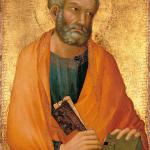Rev. Dr. Jordan B. Cooper is a Lutheran pastor, adjunct professor of Systematic Theology, Executive Director of the popular Just & Sinner YouTube channel, and the President of the American Lutheran Theological Seminary (which holds to a doctrinally traditional Lutheranism, similar to the Lutheran Church – Missouri Synod). He has authored several books, as well as theological articles in a variety of publications. All my Bible citations are from RSV, unless otherwise indicated. Jordan’s words will be in blue.
This is my 8th reply to Jordan (many more to come, because I want to interact with the best, most informed Protestant opponents). All of these respectful critiques can be found in the “Replies to Lutheran Theologian / Apologist Jordan Cooper” section on the top of my Lutheranism web page.
*****
This is a response to the end portion of Jordan’s YouTube video, Sola Scriptura: Scripture Alone (The Five Solas) (2-24-24).
For the definition of sola Scriptura, see my paper, Sola Scriptura as Defined by Historic Protestantism [12-15-21]. Remarkably (but honestly and correctly), Jordan Cooper stated in his video, “A Defense of Sola Scriptura“ (3-12-19):
I think the question that we have is: do we have to find a particular Scripture that says Scripture is the only authority? And I just don’t think we have to. We don’t. There’s nothing in — you can’t find — in any of Paul’s letters, for example, . . . “by the way, Scripture is the only authority and traditions are not an authority and there is no magisterium that is given some kind of infallible authority to pass on infallible teachings.” It seems like a lot of Roman Catholic apologists think that for Protestants to defend their position, that they have to find a text that says that.” [1:39-2:14]
Yes they do, in the nature of things. I dismantled this “argument” in 2004: Sola Scriptura is Self-Defeating and False if Not in the Bible (vs. Kevin Johnson) [5-4-04].
38:39 Scripture is . . . our sole infallible authority.
Scripture itself refutes this — particularly in the Jerusalem Council in Acts 15 and 1 Timothy 3:15 — as I have detailed many times. See my Bible & Tradition web page: section “III. Sola Scriptura (Scripture as the Only Infallible Authority).”
38:47 it’s our sole God-breathed authority. There is nothing that has the kind of authority that Scripture has.
We all agree that it’s “God-breathed” (i.e., inspired) and in many respects quite unique. The specific dispute with regard to sola Scriptura, however, is whether it is the only infallible authority. It’s not. Sola Scriptura can’t be true (at least in its standard definition) according to the Bible itself. I’ve also made an extended argument that there are even inspired utterances, prophecies, and teachings besides Scripture: Reply To Gavin Ortlund’s 6-Minute Sola Scriptura Defense (Including the Biblical Case for Prophets as Inspired and Infallible Authorities Besides Holy Scripture) [1-26-24].
40:59 2 Timothy 3:16: it [Scripture] is breathed out by God or God-breathed. It is inspired by the Spirit.
So was the prophet Agabus, who “stood up and foretold by the Spirit that there would be a great famine over all the world; and this took place in the days of Claudius” (Acts 11:27-28; cf. 21:10-11, where he predicts Paul’s captivity, prefacing his words with “Thus says the Holy Spirit, . . .”). That’s breathed by the Holy Spirit, too. Paul wrote that “the mystery of Christ, . . . has now been revealed to his holy apostles and prophets by the Spirit” (Eph 3:4-5). Peter wrote that true prophecies were inspired: “no prophecy ever came by the impulse of man, but men moved by the Holy Spirit spoke from God” (2 Pet 1:21).
The first Christian council in Jerusalem was inspired, since the Holy Spirit agreed with it (Acts 15:28). The first pope, Peter, even made an infallible declaration in the council (Acts 15:7-11) that was crucial in its determination. This in turn was largely based on a “vision” (Acts 10:17) that God gave to Peter (Acts 10:11-16), while he was in a “trance” (Acts 10:10). God showed him the meaning of it by sending to him the Gentile centurion, Cornelius (Acts 10:25 ff.), to whom He had communicated by an angel (10:22, 30-32). The larger point is that so much of this had nothing directly to do with Scripture at all. Yet it was infallible (and arguably inspired as well).
Moreover, when Jesus was talking to His disciples about future persecution, He said, “do not be anxious how or what you are to answer or what you are to say; for the Holy Spirit will teach you in that very hour what you ought to say” (Lk 12:11-12). Mark in his parallel passage puts it even more strongly: “it is not you who speak, but the Holy Spirit” (Mk 13:11). Zechariah, the father of John the Baptist “was filled with the Holy Spirit, and prophesied” (Lk 1:67). Simeon also had a close relationship with the Holy Spirit (Lk 2:25-26).
Now, if the Holy Spirit can talk to Jesus’ disciples in that way (and by extension possibly to any follower of Christ), or literally talk through them, is that “divine speech” or “the words of God”? Since the Holy Spirit is God, the answer must be yes. But again, that’s not Scripture. Paul also refers to two spiritual gifts that seem to involve direct communication from God to human beings: “To each is given the manifestation of the Spirit for the common good. To one is given through the Spirit the utterance of wisdom, and to another the utterance of knowledge according to the same Spirit” (1 Cor 12:7-8). Here again God the Holy Spirit is communicating to persons. It seems to me that all words that authentically come from God must be considered to be inspired, as all of God’s words are.
Jordan himself admits this at 44:48: “we recognize in the Old Testament, God sent prophets, and when the prophet Isaiah spoke he spoke the word of God. The people of Israel didn’t have to stop and say “we’re going to wait till he writes it down . . .”. I would only add that the office of prophet is present in the New Testament and new covenant as well.
I made an analogical argument from Ephesians 4:11-15 (see the passage) in my first book, A Biblical Defense of Catholicism (pp. 15-16), in response to the alleged sola Scriptura prooftext, 2 Timothy 3:16-17. Here is the heart of that argument:
Note that in Ephesians 4:11-15 the Christian believer is “equipped,” “built up,” brought into “unity and mature manhood,” “knowledge” of Jesus, “the fulness of Christ,” and even preserved from doctrinal confusion by means of the teaching function of the Church. This is a far stronger statement of the “perfecting” of the saints than 2 Timothy 3:16-17, yet it doesn’t even mention Scripture.
Therefore, the Protestant interpretation of 2 Timothy 3:16-17 proves too much, since if all nonscriptural elements are excluded in 2 Timothy, then, by analogy, Scripture would logically have to be excluded in Ephesians. It is far more reasonable to synthesize the two passages in an inclusive, complementary fashion, by recognizing that the mere absence of one or more elements in one passage does not mean that they are nonexistent. Thus, the Church and Scripture are both equally necessary and important for teaching. This is precisely the Catholic view. Neither passage is intended in an exclusive sense.
To expand the original argument regarding Ephesians 4 a bit: Protestants are saying that Scripture is the rule of faith. It is the sole and ultimate criterion for theological doctrine and truth, insofar as it is regarded as the only infallible authority. Therefore, it stands to reason that in a passage talking about truth over and over again, and denouncing falsehood, and referring to “one faith” and “the unity of faith”, that Scripture would likely be mentioned (under the erroneous Protestant premise). It’s not absolutely necessary, but it would be probable, I think.
This would be a logical place for Paul to reiterate that the Scripture is the rule of faith. But he never does that. He refers repeatedly to truth and denounces falsehood, and refers to the Church over and over: “one body”; [listing of Church offices]; “body of Christ”; “the whole body”; “bodily growth”; “members of one another”.
Now, under Catholic assumptions of the “three-legged stool” (Church, Scripture, Tradition), this is perfectly plausible and would be predictable. Not all have to be mentioned in the same context. Any one of them can be (or all of them, or any combination thereof), because they are all authoritative.
41:12 Jesus says Scripture cannot be broken (John 10:35). Those kinds of things are not true of anything else outside of the text of Scripture.
I just demonstrated how those things are false. Every true prophecy or vision or direct communication of God to men (of which there are many examples in Scripture) can’t be “broken” either, because they involve the words of God the Holy Spirit.
41:30 Now what does Scripture then say about tradition and the Church? Well, Paul says in 1 Timothy 3:15 that the church is “the pillar and foundation of the truth” and some Roman Catholics will quote that and say, “there you go: the Church is the pillar and foundation of the truth, therefore sola Scriptura is wrong.”
Indeed it is, once one seriously considers what is expressed in 1 Timothy 3:15. The Church can’t possibly be the “pillar and ground of the truth” without at the same time being infallible. And if it can be and is infallible, then sola Scriptura — which denies this characteristic to anything but the Bible — collapses in a heap, from this one Bible passage alone (see how I fully unpack the meaning of the passage).
42:41 It is the foundation of the truth because it is the place where Scripture is taught and preserved . . .
He just got through noting that the passage doesn’t talk specifically about the bishops of Rome (which is true, but irrelevant to the Catholic argument from this verse, which only depends on “the Church” — whatever it is — being referred to). Having done that, he turns around and makes this claim, which is nowhere in the text, either. It’s simply superimposed. “Scripture” is never mentioned in chapter 3 of 1st Timothy. It’s mentioned twice in the entire letter (4:13; 5:18), but neither instance has the slightest relation to what Jordan is claiming. “Word of God” appears once in 4:5, but again, not in any sense related to the hopeful claim. The Bible actually teaches that the Church is the foundation of the truth and includes a thing like the Jerusalem Council, which shows the Church actually displaying and exercising this God-given authority.
I wrote a paper once that was about what I thought was a very interesting topic: St. Paul’s Word Selection vs. Sola Scriptura [4-3-10]. One can read the details there of how I did my tabulations, but several interesting facts emerged from it:
The words “Scripture” or “Scriptures” appear 51 times in the New Testament. Yet in eight of his thirteen epistles (2 Corinthians, Ephesians, Philippians, Colossians, 1 & 2 Thessalonians, Titus, Philemon) St. Paul (it may be surprising to learn) never uses either of these words. He uses it only 14 times altogether: in Romans (6), 1 Corinthians (2), Galatians (3), 1 Timothy (2), and 2 Timothy (1).
Likewise, “word of God” appears 43 times in the New Testament, and many of these (as in Old Testament prophetic utterances) are intended in the sense of “oral proclamation” rather than “Scripture” (especially apart from the Gospels). St. Paul uses the phrase only ten times, in nine different epistles. And it is by no means certain that any individual instance refers without question specifically to Holy Scripture, rather than to oral proclamation of apostolic tradition. I suspect that it is much more likely the latter sense in most or all cases.
In surveying Paul’s thought-world, then, as indicated by his choices of words and notions, in his teaching of the gospel and the content of the Christian faith in his epistles, we arrive at the following tally:
“Scripture(s)”: 14 + 84 citations of OT = 98
“Church” (20) and “Body (of Christ)” (19) = 39
“Tradition” and equivalent terms and concepts: 73
We can see that the tradition and Church legs of the “three-legged stool” are indeed prominent and together make up 53% of the 210 total instances, whereas Scripture appears 47% of the time (112-98). Moreover, I have not included obvious aspects of Church authority such as bishops and elders; the Jerusalem Council, etc. That would add even more non-scriptural authority to the mix.
In eight of the twelve epistles above, the combination Church/Tradition appears more than Scripture. In six of these eight, the “tradition” category alone outnumbers Scripture; two by very wide margins (2 Timothy: 14-1; 1 Timothy: 13-2).
In Ephesians, the Church/Tradition ratio to Scripture is 18-6; other books are similar: Philippians (4-1), Colossians (12-0), 1 Thessalonians (5-0), 2 Thessalonians (3-0), Titus (4-0). Would any sola Scriptura advocate have predicted such an outcome before studying these words? Not likely . . .
Citation of the OT is just as consistent with the Catholic “three-legged stool” rule of faith as it is with sola Scriptura, and doesn’t prove the latter at all. All his frequent citations prove is that he wanted to make an elaborate case drawing from old covenant precedent.
I conclude, then, that it is implausible for sola Scriptura to be considered the Pauline rule of faith. The biblical facts just don’t add up.
In the Greek Septuagint (LXX) it’s used for “the law [of God]”: Ezra 7:26. Kittel’s Theological Dictionary of the New Testament (one-volume edition, p. 168, also, like Thayer, not a Catholic work, affirms that it refers to “written as well as unwritten traditions” in Galatians 1:14, and is equated with “Christian teaching” (1 Cor 11:2; 2 Thess 2:15); also deducing from 1 Corinthians 15:3 ff. and 11:23 ff., “that it is older than Paul and is already acquiring a fixed form in his day.” Any way we look at it, there is plenty of tradition in the sense that Catholics refer to it (including oral) in the New Testament. Because “tradition” is presented as synonymous with “truth” and the “gospel” and “the faith” etc. it, too, must be as infallible as they are. The truth itself is always infallible. If it weren’t, it wouldn’t be the truth.
Jordan then quibbles about apostolic succession and ecclesiastical primacy. But that won’t help him one whit to establish and defend sola Scriptura. It’s simply another rabbit trail and non sequitur.
45:34 Is it that Scripture is where we find the apostolic tradition today . . .?
It’s not the only place, but it’s certainly a major place where we can find both the 1) concept of tradition, and 2) examples of same. The inclusion of an infallible tradition and Church in the Bible itself is what precisely and most undeniably refutes sola Scriptura, because Protestants can’t deny the inspiration of Scripture when it makes such statements. Acts 15:28 and 1 Timothy 3:15 are themselves infallible, and they teach the infallible authority of the Church.
1:00:22 Roman Catholic apologists like to throw around this number that there are 33,000 Protestant denominations. It’s [an] absolutely ridiculous number; it’s totally inflated . . .
Some less-educated Catholic apologists do so, and it’s most unfortunate, but not me. I objected to this number and explained exactly why, almost twenty years ago: 33,000 Protestant Denominations? No! [9-4-04].
*
***
*
Practical Matters: Perhaps some of my 4,500+ free online articles (the most comprehensive “one-stop” Catholic apologetics site) or fifty-five books have helped you (by God’s grace) to decide to become Catholic or to return to the Church, or better understand some doctrines and why we believe them.
Or you may believe my work is worthy to support for the purpose of apologetics and evangelism in general. If so, please seriously consider a much-needed financial contribution. I’m always in need of more funds: especially monthly support. “The laborer is worthy of his wages” (1 Tim 5:18, NKJV). 1 December 2021 was my 20th anniversary as a full-time Catholic apologist, and February 2022 marked the 25th anniversary of my blog.
PayPal donations are the easiest: just send to my email address: [email protected]. Here’s also a second page to get to PayPal. You’ll see the term “Catholic Used Book Service”, which is my old side-business. To learn about the different methods of contributing (including Zelle), see my page: About Catholic Apologist Dave Armstrong / Donation Information. Thanks a million from the bottom of my heart!
*
***
Photo credit: gr8effect (10-30-15) [Pixabay / Pixabay Content License]
Summary: Lutheran apologist Jordan Cooper tries very hard to make sola Scriptura plausible, but there are just too many logical & scriptural holes in it (as I point out).














